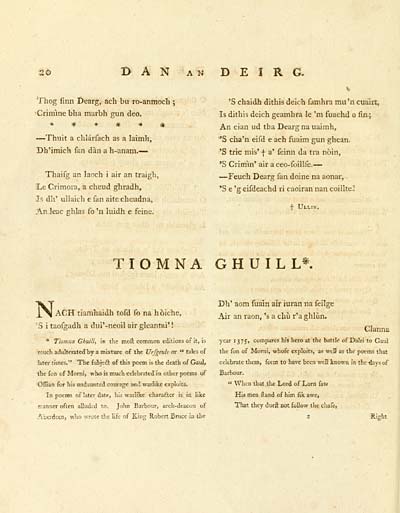Ossian Collection > Sean dana
(30)
Download files
Complete book:
Individual page:
Thumbnail gallery: Grid view | List view

-20
BAN AN DEIRG.
Thog finn Dearg, ach bu ro-anmoch ;
Crimine bha marbh gun deo.
— Thuit a chliirfach as a laimh,
Dh'imich fan dan a h-anam.—
Thaifg an laoch i air an traigh,
Le Crimoia, a cheud ghradh.
Is dli' ullaich e fan aite cheudna,
:\r, leac ghlas fo 'n luidh e feine.
'S chaidh dithis deich famhra mu'n cuaiit.
Is dithis deich geamhra le 'm fuachd o fin;
An cian ud tha Dearg na uaimh,
'S cha'n eifd e ach fiiaim gun ghean.
'S trie mis' f a' feinn da tra nòin,
*S Crimin' air a ceo-foillfe. —
— Feuch Dearg fan doine na aonar,
'S e 'g eifdeachd ri caoiran nan coillte.I
T I O M N A G H U I L L*
J_^ ACH tiamhaidh tofd fo na hòiche,
"S i taofgadh a dui'-neoil air gleantai' !
* Tiomna Ghuili, in the moil common editions of it, is
much adulterated by a mixture of the Urfgeuls or " taks of
later times." The fubjeft of this poem is the death of Gaul,
the fon of Morni, who is much celebrated in other poems of
Offian for his undaunted courage and warlike exploits.
In poems of later date, his warlike charafter li. in like
manner often alluded to. John Barbour, arch-deacon of
A'oerdsen, who wrote the \\k of King Robert Bruce in the
Dh' aom fuain air iuran na feilge
Air an raon, 's a chù r'a ghlùn.
Clanna
year 1375, compares his hero at the battle of Dalri to Gaul
the fon of Momi, whofe exploits, as weU as the poems that
celebrate them, feem to have been well known in the days of
Barbour.
" When that the Lord of Lorn faw
His men fland of him fik awe,
That they durll not follow tlie cliafe,
2 Right
BAN AN DEIRG.
Thog finn Dearg, ach bu ro-anmoch ;
Crimine bha marbh gun deo.
— Thuit a chliirfach as a laimh,
Dh'imich fan dan a h-anam.—
Thaifg an laoch i air an traigh,
Le Crimoia, a cheud ghradh.
Is dli' ullaich e fan aite cheudna,
:\r, leac ghlas fo 'n luidh e feine.
'S chaidh dithis deich famhra mu'n cuaiit.
Is dithis deich geamhra le 'm fuachd o fin;
An cian ud tha Dearg na uaimh,
'S cha'n eifd e ach fiiaim gun ghean.
'S trie mis' f a' feinn da tra nòin,
*S Crimin' air a ceo-foillfe. —
— Feuch Dearg fan doine na aonar,
'S e 'g eifdeachd ri caoiran nan coillte.I
T I O M N A G H U I L L*
J_^ ACH tiamhaidh tofd fo na hòiche,
"S i taofgadh a dui'-neoil air gleantai' !
* Tiomna Ghuili, in the moil common editions of it, is
much adulterated by a mixture of the Urfgeuls or " taks of
later times." The fubjeft of this poem is the death of Gaul,
the fon of Morni, who is much celebrated in other poems of
Offian for his undaunted courage and warlike exploits.
In poems of later date, his warlike charafter li. in like
manner often alluded to. John Barbour, arch-deacon of
A'oerdsen, who wrote the \\k of King Robert Bruce in the
Dh' aom fuain air iuran na feilge
Air an raon, 's a chù r'a ghlùn.
Clanna
year 1375, compares his hero at the battle of Dalri to Gaul
the fon of Momi, whofe exploits, as weU as the poems that
celebrate them, feem to have been well known in the days of
Barbour.
" When that the Lord of Lorn faw
His men fland of him fik awe,
That they durll not follow tlie cliafe,
2 Right
Set display mode to: Large image | Transcription
Images and transcriptions on this page, including medium image downloads, may be used under the Creative Commons Attribution 4.0 International Licence unless otherwise stated. ![]()
| Early Gaelic Book Collections > Ossian Collection > Sean dana > (30) |
|---|
| Permanent URL | https://digital.nls.uk/77964633 |
|---|
| Description | Selected books from the Ossian Collection of 327 volumes, originally assembled by J. Norman Methven of Perth. Different editions and translations of James MacPherson's epic poem 'Ossian', some with a map of the 'Kingdom of Connor'. Also secondary material relating to Ossianic poetry and the Ossian controversy. |
|---|
| Description | Selected items from five 'Special and Named Printed Collections'. Includes books in Gaelic and other Celtic languages, works about the Gaels, their languages, literature, culture and history. |
|---|

